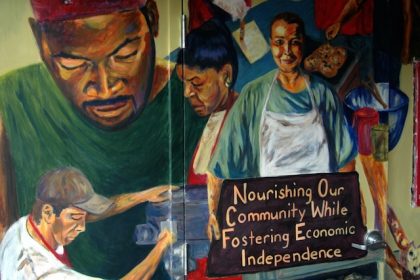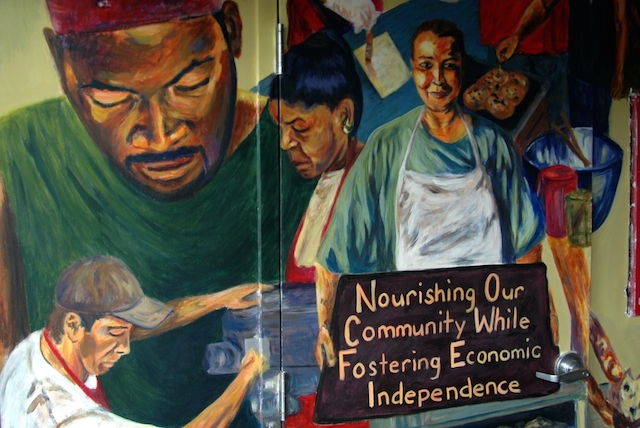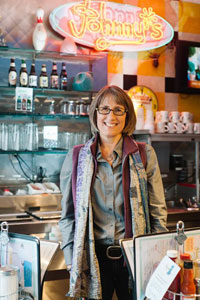
Food Solutions New England presents Making the Business Case for A New England Food Vision: Creating Conditions that Support Diverse Food-related Enterprises, a”B2B” Session with the Sustainable Business Network of Massachusetts. The event will take place Thursday, June 30, 2016, 6:30 pm to 8:30 pm at SBN’s office in Cambridge, MA.
Members of the Food Solutions New England network’s Core Team will lead an interactive discussion with local business leaders. Here, we hear from two of them.
Bing Broderick, Executive Director of Haley House:
 I believe that in order for us to succeed as a local community, we need to support one another. By looking to our neighbors as resources, we are reducing shipping costs and fuel waste, while also building our local economy. The greatest benefit of a direct sale is often the quality of the product which is fresher and nutritious for having eliminated the distributor from the equation. This arrangement often results in lower cost for the customer, more revenue going to the producer and ideally, better wages for the staff charged with producing. By growing these networks now, we will become more resilient communities and have more opportunities for local jobs and better access to healthy food in our communities, building a better future for all.
I believe that in order for us to succeed as a local community, we need to support one another. By looking to our neighbors as resources, we are reducing shipping costs and fuel waste, while also building our local economy. The greatest benefit of a direct sale is often the quality of the product which is fresher and nutritious for having eliminated the distributor from the equation. This arrangement often results in lower cost for the customer, more revenue going to the producer and ideally, better wages for the staff charged with producing. By growing these networks now, we will become more resilient communities and have more opportunities for local jobs and better access to healthy food in our communities, building a better future for all.
Karen Masterson, Owner of Johnny’s Luncheonette:
 I have owned and operated three different restaurant concepts over the last dozen years. Each of them with a deep commitment to sourcing and community engagement. While all of us, as motivated citizens, can contribute to the betterment of our communities, public spaces like restaurants have a unique role and opportunity, specifically engaging customers around food issues.
I have owned and operated three different restaurant concepts over the last dozen years. Each of them with a deep commitment to sourcing and community engagement. While all of us, as motivated citizens, can contribute to the betterment of our communities, public spaces like restaurants have a unique role and opportunity, specifically engaging customers around food issues.
My own journey has taken me from Framingham with Big Fresh Cafe (2003-2009), to Lexington with nourish (2009-2014) and now, since March of 2014 in Newton Center with Johnny’s Luncheonette. I raised three children, lost two parents, weathered (barely!) the economic recession that wreaked havoc on the restaurant industry and managed to stay happily married! The difficulties of the business, along with demands of life in general, have made me acutely aware of the challenges facing restaurant operators/owners as we navigate the space of being change makers.
Collectively we have been lulled into a system of food distribution that is cheap, efficient and ever present. The trucks that pull up daily, to the backs of restaurants across our region, unloading a dizzying array of produce have seduced us. This tremendous efficiency means that if restaurant operators have had a particularly busy day they can be restocked overnight without inconveniencing their customers. In the majority of food establishments where diners eat, the thought of routinely being out of something is currently not palatable. The extra effort it can take to bring in locally sourced food from separate vendors (or pick it up yourself!) is a challenge to most operators.
Replicating this inexpensive and incredibly responsive system for local/regional/sustainable/organic product is likely not possible for the vast majority of business owners, who are also striving to maintain price points that allow a diversity of diners to frequent their establishments. In order to significantly increase the use of locally and regionally sourced foods we will have to create new models. We will have to dig deep into our shared commitment to make it happen and allow new ideas to emerge from the vibrant soil of our imaginations. Think outside those big box trucks and come up with a whole new menu of creative solutions to get more food from our local farms onto the plates of diners across our region. Lots of work ahead and we’ll need many hands to make it happen.




